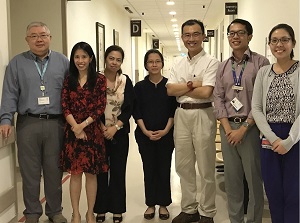
14 November 2021 - Whenever Professor Lee Tian Tee travelled, he would check with the airline or hotel whether he had access to a fridge to store eye drops for his glaucoma, a condition where the eye pressure rises due to a build-up of fluid inside the eye.
The eye condition can cause damage to the optic nerve and lead to blindness.
The Singaporean music professor, 61, was diagnosed with glaucoma in 2016 and had to live with the inconvenice of using medicated eye drops several times a day to reduce the pressured in his eyes.
In 2018, his eye doctor, Professor Paul Chew, a senior consultant at the National University Hospital's (NUH) department of ophthalmology, invited him to be part of a clinical trial for a new implant being developed at the time.
The Paul Glaucoma Implant (PGI) was developed by Prof Chew, who is part of the National University of Singapore's (NUS) Yong Loo Lin School of Medicine, and a team of clinician-scientists from the National University Health System.
Clinical trials in Singapore were successfully carried out between December 2017 and December 2018 and the implants are now used by leading hospitals and established eye centers in 17 countries, including NUH.
The device comprises a tiny tube made of medical grade silicone that is implanted through the front of the eyeball, where it is secued with an endplate. The tube allows some fluid in the eye to flow out when pressure builds up, thus preventing optic nerve damage.
Prof Lee had the PGI inserted in his right eye in 2018 and then his left in 2019. The frequent traveller, who works at the Sichua Conservatory of Music in Chengdu, China, now no longer needs eye drops to control his eye pressure.
Glaucoma implants have been around for 30 years, said Prof Chew, who has been researching the condition for 25 years.
30
Approximate number of years that glaucoma implants have been around, according to Professor Paul Chew, a senior consultant at the National University Hospital's department of opthalmology, who has been researching the condition for 25 years.
PGI improves on existing implants by using a finer tube and an endplate with a larger surface area.
"We designed this implant to give higher successful eye pressure control and consistent safety and efficacy. It is a more reliable device than current standard devices in use today. The ability to predictably manage severe glaucoma is the result of this new implant," Prof Chew said.
Depending on the type of glaucoma, treatment can take the form of medicated eye drops and laser surgery to reduce the eye pressure - but these may not be suitable for more severe forms of the disease.
Compared with eye drops and laser surgery, PGI reduces patients' eye pressure for a longer period of time.
Associate Professor Victor Koh, head of the opthalmology department at NUS Medicine and NUH, led the clinical trial of PGI.
Among the 82 patients in the trial, including Prof Lee, the implant successfully reduced the eye pressure in 93 per cent of them after one year. Patients were less dependent on eye drops after surgery, compared with other types of implants.
Prof Lee said the implants have helped greatly in improving in his quality of life.
"I have not used any eye drops since 2019. Every morning, I wake up without having to worry whether I will need to use eye drops or not. For a busy person like myself, it is really helpful."
Source: The Straits Times (c) Singapore Press Holdings
















